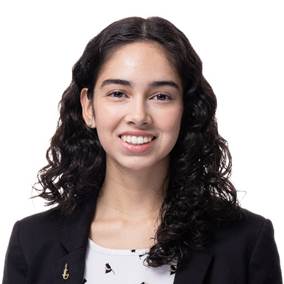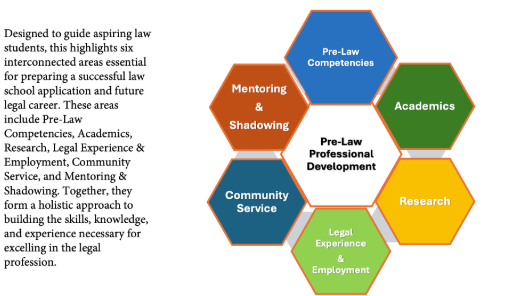“There are important skills, values, knowledge, and experience that you can acquire prior to law school and that will provide a sound foundation for a legal education. If you wish to prepare adequately for a legal education, and for a career in law or for other professional service that involves the use of lawyering skills, you should seek educational, extra-curricular, and life experiences that will assist you in developing those attributes.”
– American Bar Association Pre-Law Resources Website
The legal profession has a vast presence in our society via legal practice in public and private sectors, government, industries, etc. influencing and supporting the foundation of how we function in today’s world. The path to becoming a legal expert is through completion of a law school degree. Law schools offer a variety of degrees or certificates for individuals to pursue.
- Juris Doctorate (JD) Degree is for those who wish to practice law and be involved in other career paths as well.
- Master of Laws (LLM) is for those who already have a JD and want to expand their knowledge to study a specialized area of law and gain international qualification.
- Master’s Degree (M) are for those who want to study law but not practice as a lawyer. There are multiple concentrations such as Master of Science in Laws (MSL), Master of Legal Studies (MLS), and Juris Master (JM) in addition to others.
- Legal Certificate (CRT) for those who wish to broaden their knowledge of the law. This will assist those who work in highly regulated industries.
For all law school degrees, the core requirements for admission are a deep and diverse foundation in academics and extensive professional development through extra-curricular experiences.
Pre-Law Professional Development or PLS Questions?
Book a consultation or email rknicker@ufl.edu.
Book an appointmentPre-Law Professional Development
Professional development for pre-law students is a holistic process that includes academic achievement, practical experience, personal growth, and skill-building. It is not just about preparing for law school but also about developing as a well-rounded individual capable of thriving in the challenging and dynamic field of law.
According to the American Bar Association (ABA) the Core Skills, Values, Knowledge, and Experience needed are:
- Problem Solving
- Critical Reading
- Writing and Editing
- Oral Communication and Listening
- Research
- Leadership
- Organization and Management
- Public Service and Promotion of Justice
- Relationship-building and Collaboration
- Background Knowledge
- Exposure to the Law
Pre-Law Areas of Engagement
This graphic provides a comprehensive overview of the key components involved in Pre-Law Professional Development. Designed to guide aspiring law students, it highlights six interconnected areas essential for preparing a successful law school application and future legal career.
Beyond120 Pre-Law Courses
This course is for freshman, sophomore, or new transfer students interested in pursuing admission to law school. This course provides information for students to begin personal and professional development in preparation for application to law professional programs. Students are introduced to topics related to holistic preparation including academic and extra-curricular engagement, along with intense self-reflection of strengths, values, and areas of growth.
This course – is an immersive, interdisciplinary PRE-LAW course designed to provide undergraduate students with an in-depth understanding of the diverse career opportunities within the legal field and the management strategies employed by private legal firms. The course will cover a range of topics, including but not limited to, the structure of law firms, legal specializations, client relations, firm management, and emerging trends in the legal industry. Students will engage in discussions about the various paths available within law, from litigation to corporate counsel, and will learn about the business side of legal practice, including marketing, finance, and firm culture.
Pre-Law Scholars Program
Beyond 120 provides pre-law students in the College of Liberal Arts and Sciences with resources and support for professional development and to develop a competitive application for admission to law school through the Pre-Law Scholars (PLS) program. Through a combination of academic and experiential learning opportunities you can establish depth, diversity, and valuable insights into the legal profession, aligning with the American Bar Association’s (ABA) ‘Core Skills, Values, Knowledge, and Experience.’
Pre-Law Scholars Requirements
To be recognized as a Pre-Law Scholar you must complete a minimum of 10 activities in the areas below, 5 or more of which must be pre-law related.
| Area | Activities |
|---|---|
| Beyond120 Experience (Choose 1) | ▪︎ Beyond120 Academic Course ▪︎ Beyond120 CLAS Ambassador ▪︎ Beyond120 Excursion ▪︎ Beyond120 Study Abroad ▪︎ Beyond120 Podcast Episode |
| Immersive Experiences (Choose 2) | ▪︎ Legal Employment ▪︎ Study Abroad ▪︎ Pre-law Internship ▪︎ Research ▪︎ Lsac Admission Unmasked ▪︎ Pre-law Student Organization Leadership ▪︎ Legal Shadowing ▪︎ Pre-law Summer Program ▪︎ Pls Leadership ▪︎ Community Service |
| Foundational Experiences (Choose 3) | ▪︎ Beyond120 Blog Post Entry ▪︎ Gator Network Meeting ▪︎ Beyond120 Faculty Consultation ▪︎ Beyond120 Skills Curriculum Module ▪︎ Beyond120 Or Pre-law Workshop Or Event ▪︎ Professional Conference Attendance ▪︎ Research Publication ▪︎ Attend A Court Hearing ▪︎ Attend A Law School Class ▪︎ Lsac Forum Attendance |
| Choose Your Own Experiences (Choose 4) | ▪︎ Any Beyond120 Experience ▪︎ Any Immersive Experience ▪︎ Any Foundational Experience |
Beyond120 Pre-Law Peer Advising
Pre-Law Scholars offers peer advising opportunities for pre-law undergraduate students. There are designated pre-law peer advisors for freshman and sophomore students and Levin College of Law students for juniors and seniors. These are available via Zoom and only during the semester when classes are offered. Advising sessions are not offered during university holidays or breaks.
When logging on to Zoom, you will be asked to register you will then receive a link to join the advising session. You can register for a date ahead of time and then join when the Zoom session is scheduled. There are no specific appointment times. This is first come, first served. When joining you will be placed in the waiting room, and the peer advisor will admit you to the session when ready. This protects student privacy.
Freshmen and Sophomore Undergraduate Mentors

I am a senior pre-law student, majoring in geography. I am currently in the process of applying to law schools with an anticipated matriculation date of Fall 2026. I took the LSAT during June and August 2025 administrations using an LSAC Fee Waiver. I am also a first-generation student who has disabilities and requires accommodations for the LSAT. Some of my notable involvement on campus includes President of the Geography Club, Founder & Editor-in-Chief of The GeoScholar Journal, CLAS Ambassador, a Teaching Assistantship, and I am on the Pre-Law Scholars Student Advisory Council. I have interned for an immigration non-profit, UF Student Legal Services, and the UF/IFAS Center for Land Use Efficiency. Feel free to drop by my office hours to ask questions, discuss involvement opportunities, or learn more about some of the resources UF and CLAS offers to pre-law students. I look forward to meeting you soon!
Availability: Thursdays 10:30-11:30 am
Zoom: Register and Join
Email: simonegionfriddo@ufl.edu

Sally Walser
Sally Walser is a third-year pre-law student graduating in the spring. She is majoring in political science and criminology with a public leadership minor and hoping to obtain a certificate in public affairs. She has been a part of phi alpha delta, mock trial, and various other legal clubs. She has experience working in various internships including multiple summers at the State Attorney’s Office as well as studying abroad and interning in Wales doing a pre legal internship. She has taken the LSAT this summer and just submitted her law school applications.
Availability: Tuesdays 9:30-10:30 am
Zoom: Register and Join

Hi! I’m Sebastian, a fourth-year student majoring in Political Science and Philosophy with a certificate in AI. I scored in the 97th percentile on the LSAT and am currently considering retaking while working as a tutor. I plan to take a gap year before applying to law school, hoping to attend my dream school, UChicago. On campus, I’ve been involved with the Litigators Mock Trial team and the Florida Undergraduate Law Review. I’m happy to answer any questions about the pre-law journey, gap years, or getting involved on campus!
Availability: Wednesdays from Noon to 1pm
Zoom: Register and Join
Junior and Senior Undergraduate Mentors

Alex Leon is a 1L at the UF Levin College of Law. Alex is a first-generation CLAS alumna and graduated from UF with dual bachelor’s degrees in History and English. During undergraduate, Alex served with the Beyond120 student ambassador program, The Samuel Proctor Oral History Program, and pursued interests in education studies and legal history. After graduation, she served with the AmeriCorps VISTA program on UF’s campus with focuses on service learning and nonprofit education. As a double Gator, Alex looks forward to meeting with pre-law students and providing support through the application process!
Availability via Zoom: Mondays 2:30-3:30 pm
Zoom: Register and Join

Aubrey Mys, J.D., LL.M. in Taxation Candidate (University of Florida Levin College of Law, Class of 2026), is a first-generation law student passionate about the intersection of tax, health law, and compliance. She graduated from the University of Florida in 2022 with dual bachelor’s degrees in Psychology and Sociology. During law school, she founded and served as President of UF Law’s Health Law Association, coached the Health Law Transactional Competition Team to a second-place national finish, and competed on UF Law’s Health Law Moot Court Team as well as the National Health Law Regulatory and Compliance Team. Aubrey also serves as a Research Assistant for UF Law’s Veterans and Servicemembers Legal Clinic, supporting research on veterans’ benefits and access to care. She has been actively involved with the Florida Bar Health Law Section, the ABA Young Lawyers Division, and the National Association of Women Lawyers.
Availability via Zoom: Fridays 11:00 a.m. – 12 noon
Register and Join
Email: aubrey.mys@ufl.edu
FAQ’s
- Beyond120 graduation regalia
- Recognition at the Experiential Scholars Reception
- Include this accomplishment in your professional school application
You can keep track of your activities using the Pre-Law Roadmap in Gator Launch (Suitable app). Some activities require you to submit something such as a reflection, documentation, etc. Others like attending a Beyond120 workshop may be recorded for you.
No, we ask that you choose the scholars program most relevant to your goals. However, you can change the program you plan to complete at any time.
Yes! You can enter activities in Suitable at any time and have them count towards the recognition for Experiential Scholars. As long as you did the activity in college (not high school) it can count. This means transfer students can include activities like research or internships that were completed at their previous institutions.
How Do I Get Involved with PLS?
Additional Resources to Meet PLS Requirements
- LSAC Homepage: https://www.lsac.org/
Central hub for everything related to law school admissions
- LSAT Registration and Info: https://www.lsac.org/lsat
Includes registration, test dates, and preparation materials
- Credential Assembly Service (CAS): https://www.lsac.org/applying-law-school/cas
Service for application materials
- Official LSAT Prep Plus: https://www.lsac.org/lsat-prep/prep-plus
Prep materials
- Law School Forums: https://www.lsac.org/applying-law-school/events/law-school-forums
Local and online forums where students can meet with law school reps
- Discover Law: https://www.lsac.org/discoverlaw
Resources aimed at increasing diversity in the legal profession
- Law School Admissions Guides: https://www.lsac.org/applying-law-school/jd-application-process/choosing-law-school
Guides to help in the application process
- American Bar Association (ABA): https://www.americanbar.org/
Information about legal education, accreditation, and the legal profession
- National Association for Law Placement (NALP): https://www.nalp.org/
Stats on law school employment statistics and career resources
- S. News & World Report Law School Rankings:https://www.usnews.com/best-graduate-schools/top-law-schools
Become deeply and diversely educated by taking a diverse breadth of challenging courses to prepare for the rigors of law school.
Students are admitted to law school from almost every academic discipline. Choose a major that interests and challenges you. Focus on developing the ‘Core Skills, Values, Knowledge, and Experiences.’
In academics, this includes problem solving, critical thinking, reading, research and analysis, writing and editing, oral communication and listening, and gaining foundational/background knowledge regarding people, the profession and issues.
Areas of knowledge that might be beneficial are:
- A broad understanding of history, including the various factors (social, political, economic, and cultural) that have influenced the development of our society in the United States.
- A fundamental understanding of political thought and of the contemporary American political system.
- Some basic mathematical and financial skills, such as an understanding of basic pre-calculus mathematics and an ability to analyze financial data.
- A basic understanding of human behavior and social interaction.
- An understanding of diverse cultures within and beyond the United States, of international institutions and issues, of world events, and of the increasing interdependence of the nations and communities within our world. https://www.americanbar.org/groups/legal_education/resources/pre_law/
Subject Areas:
- Logical and Critical Thinking: Courses such as in philosophy, especially those focusing on logic, help develop critical reasoning skills. Computer science courses that will connect legal education with national and international institutions.
- Writing and Communication: Strong and precise writing skills are essential for law students. Courses in English, rhetoric, or communications will assist in the ability to express ideas clearly and effectively.
- Public Speaking: Courses in speech, debate, or rhetoric to enhance oral communication skills, which are crucial for the practice of law.
- Political Science and Government: These courses offer insights into the structure and function of government systems, legal processes, and political theory.
- History: Aid in the ability to comprehend historical contexts of legal systems, constitutional history, and influential legal cases.
- Economics: Provides an understanding of economic principles and policies, useful, especially in areas regarding corporate or tax law.
- Sociology and Psychology: Courses provide help in understanding human behavior and social systems, helpful in areas such as family, criminal, and civil rights law.
- Ethics: Courses in ethics or morals are valuable for analyzing and discerning ethical dilemmas, common to legal disciplines.
- Criminal Justice: Provides insight into legal system, criminal laws, and the justice process.
- Pre-Law Studies: Beyond120 and UF offer specific courses in legal studies or pre-law, which provides foundational knowledge regarding the legal profession.
- Research Methods: Provides the opportunity for acquiring the skills of research methods, critical thinking and decision making.
- Constitutional Law: Offers insight into the content of the Constitution, which is fundamental to all areas of American law.
(Adapted from: Pre-Law Requirements: A Guide for Law School Preparation | Bold.org)
UF Courses
Undergraduate Catalog Courses Website
Some courses may have prerequisites and may not be offered every semester. Please check the Schedule of Courses and Course Descriptions for more information. General Education and Writing designations are always subject to change. Always check for designations when you are registering.
- Beyond120 – CLAS and UF
- Beyond120 Research
- UF Student Legal Services
- Levin Law Faculty Research
- UF Junior Research Fellows
Present and Publish
- Center for Undergraduate Research
- UF/IFAS Research Positions
- UF Undergraduate Research Assistantship Program
- UF Undergraduate Research Database
- Emerging Scholars Program
- McNair Scholars Program
- Undergraduate Law Review
- Summer Undergraduate International Research Program
- Beyond120 Pre-Health Global Engagement – Study Abroad/Exchange Programs
- University Scholars Program
Non-UF Research Opportunities
- Research Experiences for Undergraduates (REUs)
- Research Search Engines
- Summer Programs (SURPs)
- 1000 Law Thesis Topics and Ideas – iResearchNet
Labs and Research Groups by Department
- Beyond 120 Internships
- UF Student Legal Services
- Legal Aid & Pro Bono Service
- Career Connections Center
- Sociology and Criminology & Law
- Gator Career Link Portal
- Attend and observe legal cases
- USAJOBS – The Federal Government’s official employment site
- Homepage | LSC – Legal Services Corporation: America’s Partner for Equal Justice
- UF Legal Services – Student Ambassadors
- Home – Three Rivers Legal Services Free Civil Legal Help
- The James C Adkins Jr American Inn of Court – American Inns of Court
- Office of the Public Defender 8th Judicial Circuit
- Congressional Hispanic Caucus Institute (CHDI)
- Alachua County – The Eighth Judicial Circuit of Florida
Internship Site Suggestions (be sure to research all options)
- American Bar Association
- American Civil Liberties Union
- Human Rights Campaign
- Immigration Equality
- International Law Institute
- JusticeCorps
- Koch Internship Program
- Lawyers’ Committee for Civil Rights
- FirstGEN Fellows Program
- National Immigrant Justice Center (NIJC)
- People for the Ethical Treatment of Animals
- Sponsors for Educational Opportunity (SEO)
- United Nations
- US Department of Defense (for civilians)
- US Department of State
- US Supreme Court
- World Intellectual Property Organization
- Bennett Inn of Court – Gainesville, Florida
Lists with multiple volunteer sites:
- VolunteerMatch – Where Volunteering Begins
- Nonprofit Jobs, Volunteering, and More – Idealist
- Gainesville Volunteer (List)
A few options:
- Alachua County Family Services Center
- AARP Foundation SCSEP
- Beyond 120 Internships
- Bob Graham Center for Public Service
- UF David and Wanda Brown Center for Leadership & Service
- Tacachale
- Alachua County Crisis Center
- Alachua County Library Literacy Programs
- Alachua County School Volunteer Program
- ARC of Alachua County
- Balance 180 Gymnastics and Sports Academy
- Eldercare of Alachua County
- Field and Fork
- Florida Association of Volunteer Centers (FAVC)
- Grace Marketplace
- Noah’s Endeavor
- Oak Hammock
- Peaceful Paths
- Salvation Army Homework Club: contact Shera Sherman at 352-376-1743 x 7101
UF does not endorse any programs other than the study abroad programs approved through the UF Beyond120 and the International Center. Private programs should be carefully researched. Students participate at their own risk and should be fully aware of the ethical issues involved in international volunteer programs.
- Beyond120 Global Engagement
- Beyond120 Exchange Programs
- Beyond120 Study Abroad
- Beyond120 Excursions
- College of Liberal Arts & Sciences Study Abroad
- UF Study Abroad
Other options:
Choose your student involvement based on your personal and professional interests. Please go to Find an organization – GatorConnect – University of Florida and search for options you may be interested in.
Some Pre-Law student organizations: Please search for additional options of your choosing
- Pre- Legal Honor Society
- Florida Undergraduate Moot Court
- Minority Pre-Legal Society
- Undergraduate Mock Trial Team
- First-Generation Lawyers
- Gator Society for Pre-Law Women
- Florida Undergraduate Law Review
- Phi Alpha Delta – Pre-Law
- Florida Intellectual Property Alliance
- Florida Business Law Society
- Criminology and Pre-Law Honor Society








